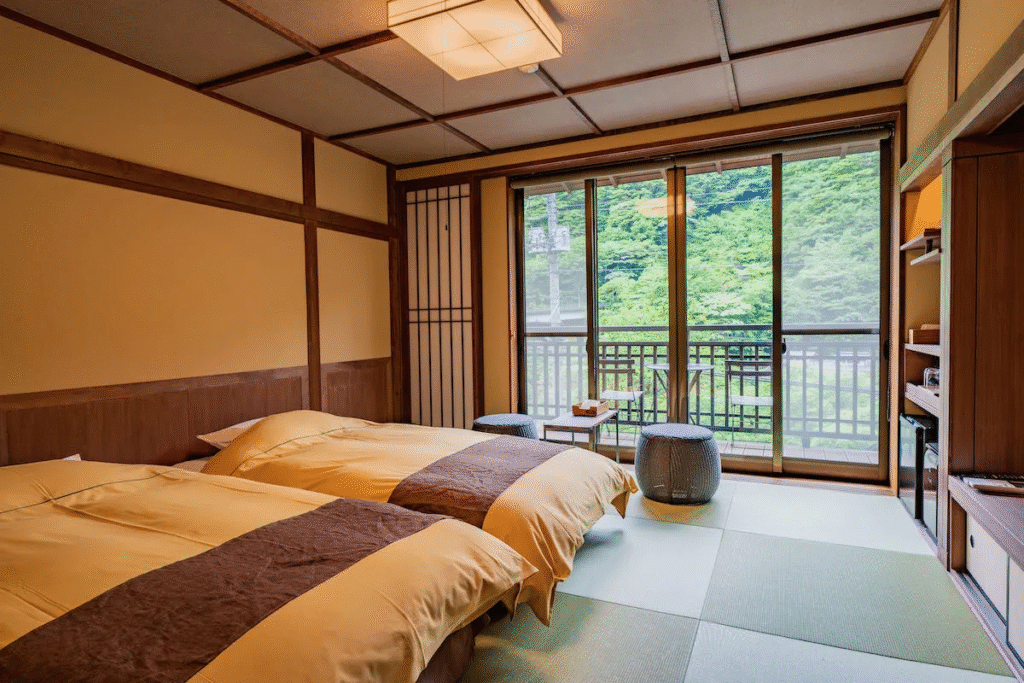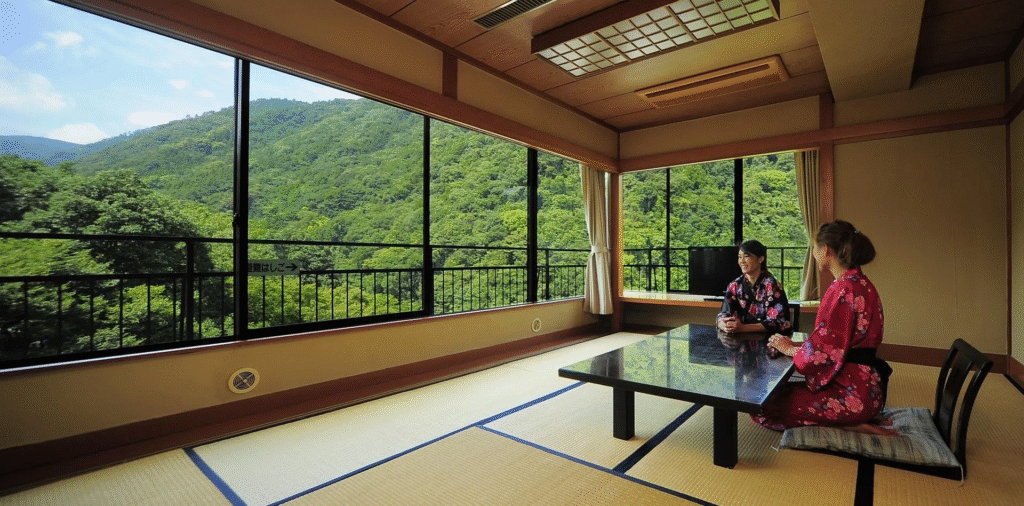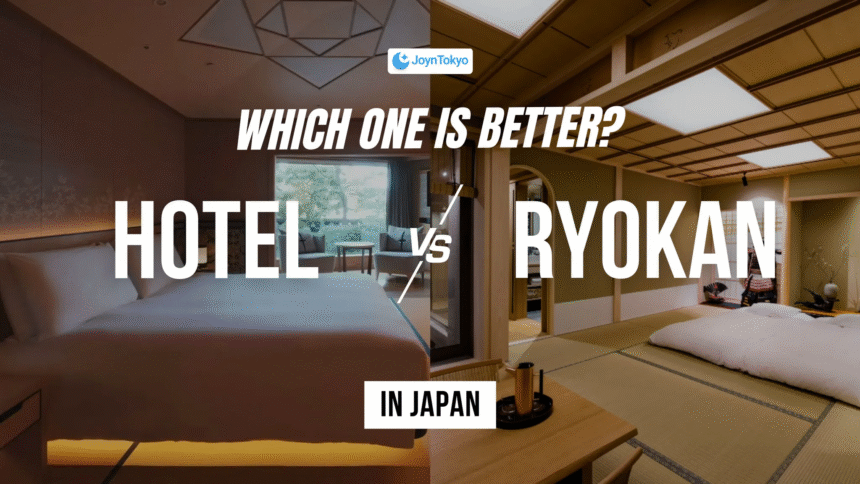Living in Tokyo is a joy. But sometimes, you’ll want to go further abroad: the snows of Sapporo, the sunshine of Okinawa, the food of Osaka… Japan is a nation with many wonderful cities, towns, and villages to visit. But where will you stay?
As with anywhere else, Japanese towns have hotels for travelers, but there is a somewhat unique phenomenon: the ryokan. Ryokan are traditional Japanese inns, often popular with tourists. But are they better or worse than a regular hotel? Let me take you through my experiences, and you can decide for yourself.
What is a Ryokan?

Put simply, a ryokan (旅館) is a traditional inn. They are especially popular in locations of natural beauty, or proximity to hot springs. They differ from hotels in that they tend to be more affordable (though this may not be the case for more famous ryokan) and have more shared facilities for guests. That being said, they provide more services, usually including breakfast and dinner, than minshuku (民宿), or guest house.
Benefits of Hotels

The big thing about hotels compared to ryokan is the level of privacy and access to personal amenities. In a hotel, you’ll have your own bath, shower, and kettle to make tea. You’ll also be able to get room service or have access to a mini-fridge with snacks and drinks. While not unheard of in ryokan, these benefits are a little less common. When I’ve stayed at Japanese hotels, I’ve always been impressed by the vending machines where you can get almost anything: food, drink, even toys. I’ve also been able to get points for future visits on hotel apps, which is something not offered by many ryokan. I’ve also had the chance to enjoy all-you-can-eat and all-you-can-drink buffets. These are incredible, and not offered by many ryokan. Plus, the food and drink was delicious.
Disadvantages of Hotels
The first and biggest consideration is the price. Hotels are almost always more expensive than ryokan, and there is less of a personal touch. This is not to say that Japanese hotels are unfriendly — far from it. I remember going with a friend to Osaka to visit Universal Studios Japan, and while it was technically a room for one, the people at the desk were understanding and accommodating.
This all depends on the hotel, of course. I’ve heard a friend of mine booked a room in a Love Hotel (typically a place for romantic dalliances) with his friends because the price was so appealing. There are also some more affordable hotels in smaller towns, and even less populous areas of Tokyo. I’ve stayed at one or two that were inexpensive, but a little bit out of the way.
Benefits of Ryokans

Familiarity is the benefit for hotels, but for ryokan, the big draw is the personality. Almost all ryokan will have their own history, style, and atmosphere. Not only that, but the landlord or landlady of the ryokan will also be a possible friend.
I remember when I visited Nikko some years ago, after getting off the train, I was very hungry, so I stopped at a local restaurant. When the landlady called to check on my progress, and I told her where I was eating, she said “oh! That place is great! Call me when you’re finished, and I’ll pick you up in my car.”
I was amazed that she was so kind as to pick me up. Not only that, but when we arrived at the ryokan, she detailed local hotspots to visit (including giving me leaflets and brochures in English) and made clear the time for breakfast. Not all ryokan will serve breakfast (or indeed any food) but many will.
I also once stayed at a ryokan in Okinawa prefecture, where the landlady provided breakfast and dinner, as well as helping me navigate the small island of Zamami. The kindness of a host is almost a given in Japan, but the local knowledge and advice that they can impart is invaluable.
Disadvantages of Ryokans
All that being said, it really depends on what ryokan you stay at. I’ve also been to a ryokan on the main island of Okinawa that was… a little lackluster. I paid ¥10,000 per night to stay in a bunkbed in a small room with a dozen other men, kept awake by my bunkmate’s snoring. After two nights, I left to find more affordable accommodations, and after only a short walk, I found an ocean-themed place where the host would greet his guests with a fresh beer when we returned.
Another thing to consider is the relative lack of privacy and the need to share facilities. Unlike a hotel, ryokan are likely to have communal kitchens, showers, baths, and toilets. For a lot of people this won’t be an issue, but you’ll have to remember that if your allotted time to go to the bath is a certain time, you have to be there. If you miss it, you’re out of luck.
Another thing to bear in mind is that many ryokan will offer yukata to wear, instead of pajamas. For many, this is a fun way to experience authentic Japanese causal-wear. For others, it can be frustrating if you do not know how to properly tie an obi, a Japanese kimono sash.
Ryokans vs Hotels
Let’s break it down with this helpful table:
| Hotel | Ryokan |
|---|---|
| Standardized | Unique |
| High Level of Privacy | More Communal |
| Membership Benefits | Personal Advice from Host |
| Get What You Pay For | Could Get a Bargain… Could Pay Too Much |
To be honest, it entirely depends on your mood and needs. If you want a reliable stay that you’ve experienced before and are comfortable with, then you might want to go for a hotel. Safe, simple, solid. But if you’re looking for something truly Japanese, from the architecture to the bathwater to the host, then ryokan is the way to go.
As for me? I’d always pick the ryokan. Japanese hotels are truly wonderful, but there’s nothing quite like a chat with a friendly host and a nice bath with water from local volcanic sources.







